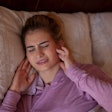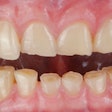
Sleeping less than six hours nightly may be linked to more jaw pain and a higher rate of comorbidities, including widespread pain and psychological problems in patients with temporomandibular disorders (TMDs), according to a study published on May 10 in the Journal of Oral Rehabilitation.
Therefore, sleep duration may play an important role in the prognosis and treatment response of patients with TMDs, the authors wrote.
“Such results suggest the importance of identifying sleep quantity and related problems in the TMD patient group,” wrote the authors, led by Dr. Ji Woon Park, PhD, of the Orofacial Pain Clinic at the Seoul National University School of Dentistry in Korea.
Up to 60% of the general population is affected by TMDs. TMDs are the second most common cause of orofacial pain behind toothache. It is common for TMDs to be associated with comorbidities, including headache, sensory disturbances, chronic fatigue, and sleep disorders.
Based on self-reported past studies, up to 90% of patients with TMDs report poor-quality sleep. In addition, low-quality sleep led to a 32% rise in the incidence of first-onset TMD and was associated with greater levels of pain, according to the authors.
Despite the mounting evidence related to the correlation between increased pain, psychological stress, and sleep quality and quantity, no previous research has studied their interrelationship in patients with TMDs. The study comprised 63 women with TMDs who responded to questionnaires to assess their levels of stress, psychological distress, autonomic symptoms, and sleep quality.
Following conservative treatment, behavioral therapy with instructions to correct parafunctional habits, physical therapy with a moist hot pack, ultrasound and electrical stimulation therapies, medication with analgesics, and an occlusal stabilization splint with full coverage of the upper teeth, the women’s sleep quality, pain levels, and comorbidities were analyzed during regular checkups conducted monthly.
Initially, 23 women reported short (fewer than six hours) sleep cycles, 27 women reported normal (six to eight hours) sleep cycles, and 13 women reported long (more than eight hours) sleep cycles. Some of the women did not attend the study's follow-up visits.
At three-month follow-up visits, 15 women reported short (fewer than six hours) sleep cycles, 15 women reported normal (six to eight hours) sleep cycles, and five women long (more than eight hours) sleep cycles. At their six-month follow-up visits, 12 women reported short (fewer than six hours) sleep cycles, 15 women reported normal (six to eight hours) sleep cycles, and five women reported long (more than eight hours) sleep cycles, according to the study.
Significantly fewer patients in the group who slept more than eight hours per night reported pain on voluntary mandibular movement (p = 0.042). Meanwhile, depression (p = 0.043) and psychological stress levels (p = 0.002) were significantly higher in the group that slept fewer than six hours per night, the authors wrote.
Additionally, the smallest decrease in pain intensity after six months of treatment was in the women who slept fewer than six hours per night. Those showing significant improvement in pain were 41%, 64%, and 66% for the short, normal, and long sleep-period group, respectively, the authors reported.
Several limitations should be considered with the results, including that the sample size of each sleep duration group was relatively small and decreased with long-term follow-up visits, the authors noted. Future studies should involve larger groups of participants to draw more specific results, they wrote.
“Short sleep is associated with more comorbidities and unfavorable long-term treatment response in TMD,” Park et al wrote.




















